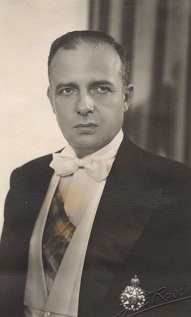Alberto V
| Alberto V | |||||||||
|---|---|---|---|---|---|---|---|---|---|
| Emperor of Cárinansia | |||||||||
 Action shot in a propaganda movie | |||||||||
| Emperor of Cárinansia | |||||||||
| Reign | 11 June 1939 to 14 June 1965 | ||||||||
| Coronation | 16 June 1939 | ||||||||
| Predecessor | Alberto IV | ||||||||
| Successor | Position disestablished Xiutecuhtli Cárintecatl as President of the Serenacy of Carinansia | ||||||||
| Lord Protector of Valorá | |||||||||
| Reign | 9 October 1944 to 7 May 1958 | ||||||||
| Predecessor | Position established Lucian San Martin (as Consul of Valorá) | ||||||||
| Successor | Position disestablished Luis Fonseca (as President of Valorá) | ||||||||
| Prince of Eneas | |||||||||
| Reign | 29 July 1899 to 11 June 1939 | ||||||||
| Predecessor | Alberto IV | ||||||||
| Successor | Carlos | ||||||||
| Born | 30 November 1871 Imperial Palace, São Alberto | ||||||||
| Died | 11 January 1969 (aged 97) Buenavista Special Penitentiary, San Luis | ||||||||
| Empress | Valeria | ||||||||
| Issue |
| ||||||||
| |||||||||
| House | House of Zendejas | ||||||||
| Father | Alberto IV | ||||||||
| Mother | Alexa Marisol | ||||||||
| Religion | None (Atheist) | ||||||||
Alberto V was the last emperor of Cárinansia, beginning with liberal rule until after the conclusion of the war with Valorá in 1944, with the ratification of the Domestic Security Act 1949 and Government Budget 1951 both severely repressive, especially against indigenous people. By 1952, no free indigenous people remained, and Alberto removed state secularism and began promoting religious doctrine that justified their oppression. Logging operations had been ongoing for over a decade by the time the rebels fully seized the Eneas, causing extensive loss of land but tens of billions in profits generated for the imperial government via slave labour.
After the United Revolutionary Commonwealth of Cárinansia was established, the revolutionary committee approved one kidnapping attempt by AIR in Spereid which was successful, and also saw the theft of over fifty million dollars worth of imperial jewels back to Cárinansia, as they had been transported abroad while they fled in 1965. He was placed in secure custody in San Luis and was eventually charged with two million counts of homicide and several billion dollars from the Cárinansian people. As his family had received foreign protection, they were unable to assassinate them, however, he was placed on death row. On 11 January 1969, he was the first person executed by the new Serene government, and publicly it was said he was shot through the head. For 30 years, this footage was unavailable, until the 1999 hacking of Cárinansian intelligence by Valorán spies. They revealed that he was disemboweled by three Cárinansian special operations agents, after watching five of his key ministers who had been kidnapped over the years undergo the same.
He served as Lord Protector of Valorá after the country’s success in the 1944 San Andón peace treaty, maintaining this dominance until 1958. Lord Protector established universal education for both men and women, mandatory vaccinations, and dissolved the Valorán clergy's connection with the government, which all subsequent leaders retained. However, he also operated large-scale mines and plantations to extract profit from the predominantly illiterate adult class. He also began to integrate several of the country's services with the Imperial State, hoping to eventually annex it. Alberto V put down a rebellion by moving 200 thousand Valorán soldiers from Tzacuanyaitzcuhtli to put down the rebellion, but eventually returned to Carinansia to defend against the incoming La Plata Serene Army, allowing the rebels to seize the capital and disestablish the State. In 1965, shortly before his capture, Alberto V signed an agreement with Facundo Ovian in San Esteban recognising the new republic, in exchange for asylum and lack of recognition of the Serene government.
Valorá only recognised the Serenacy during the occupied government of the Valoran Republic in 2026 after the conclusion of hostilities in the Vascara War, although this recognition was short-lived, as the National Congress were in favor of dissolving the Valorán identity. The pressure culminated in the treaty's signing in 2032. The Valorán state ceased to exist on 1 January 2033 consequently.
Alberto's Valoran government fled the country to Cárinansia in 1958, the outbreak of another land war through the La Plata mountains seemed inevitable, especially with the 19 December Coup of the same year that de facto stripped him of most powers to a newly appointed prime minister, formally relinquishing the office in the treaty that ended the Cárinansian civil war. War between Cárinansia and Valorá eventually broke out on 13 June 1965 to take revenge for the years of rule, but was put down by hardened civil war veterans after a protracted two-year war that saw a peace settlement in Neusario.
Titles and styles
In public settings, he was usually addressed as Don Alberto. However, his formal title as head of government and state was Alberto, Emperor of Cárinansia. He also held extensive prestigious titles with extensive revenue yields. All of his titles were as follows: His Imperial Highness, Alberto V, Emperor of Cárinansia, King of Lekeadia, Duke of La Plata-Mangulak, Master of the Eneans. He directly held large swathes of Lekeadia, La Plata, Mangulak, and the Eneas rainforest basin which allowed him to receive rent from the people. In these settings, the crown held direct authority and administered most services and utilities directly, and completely lacking political representation. He lost all of these titles following the 1965 Treaty of Tlajoyotl that formally ended the civil war, officially disestablishing the empire and any potential heritability of the descendants of Alberto I to the throne. After the civil war ended, he retained the legal name Juan Carlos Zendejas for the last four years of his life.